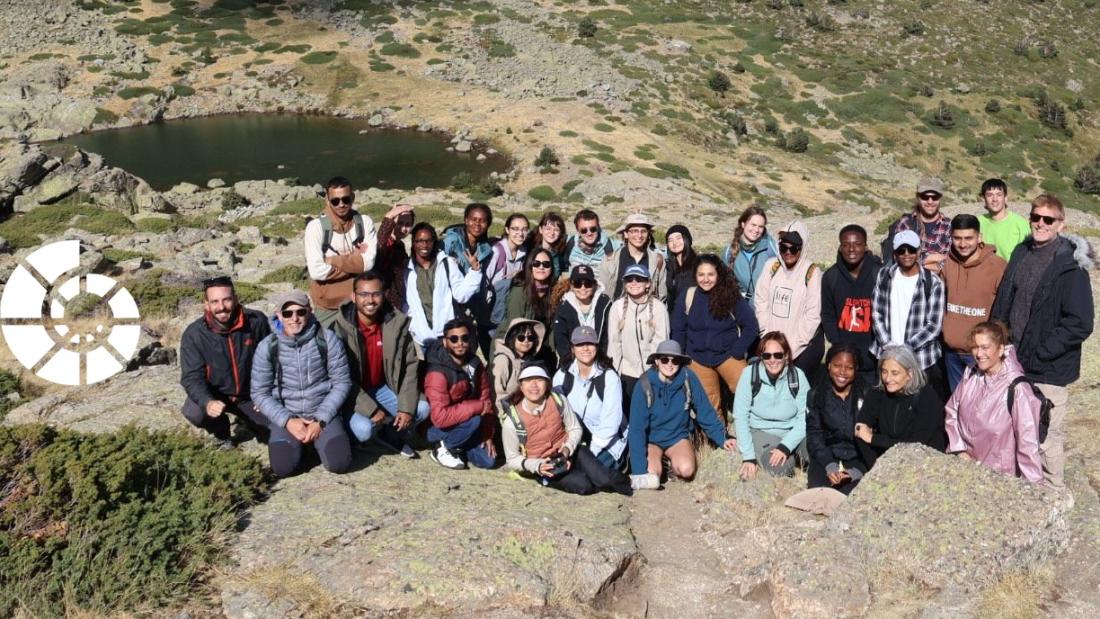In an era of unprecedented demand for ecosystem restoration, a new generation of conservation leaders has begun their journey. This September, Bangor University joined three partner institutions in welcoming the inaugural cohort of the GLOBE Erasmus Mundus Joint Master's programme.
As international agreements set ambitious targets for ecosystem restoration and biodiversity protection, the demand for professionals who can bridge fundamental ecology with practical conservation management has never been greater. GLOBE (Global Change Ecology and Biodiversity Management) is a two-year master's programme designed to develop future experts who will advance global change ecology and biodiversity conservation through international collaboration. GLOBE’s distinctive feature is that rather than remaining at a single institution, students study across four partner universities, moving between Spain, the UK, Portugal, and Mexico, gaining diverse perspectives on conservation challenges and solutions.
Welcome week in Madrid
This September the first cohort of 25 students from countries spanning America, Europe, Asia, and Africa, began their two-year journey with a welcome week at Universidad Rey Juan Carlos (URJC) in Madrid. The week provided students with their first taste of the international collaboration that defines GLOBE. They met coordinators from all partner universities - URJC, Bangor University, Universidad Autónoma de Tlaxcala in Mexico, and the University of Lisbon in Portugal – who will guide them through their upcoming semesters as they move between institutions.
Welcome week highlights included exploring the URJC campus, sharing traditional Spanish meals with lecturers, and a trip to Parque Nacional de la Sierra de Guadarrama, where students trekked to Peñalara Lagoon.
Building the future of conservation
Dr Farnon Ellwood, Senior Lecturer in Ecology & Conservation at Bangor, said
Our first cohort represents the future of conservation. They will be leading ecosystem restoration projects, shaping conservation policy, and advancing conservation science. We're giving them the tools to make a real difference. GLOBE is more than a master's programme - it's building a global network of conservation leaders. The friendships and collaborations that began during welcome week will last throughout their careers and amplify their impact.
A global approach to conservation education
Students will continue their first semester at URJC in Madrid, developing advanced understanding of global change drivers and their ecological impacts, while receiving training in experimental design, data analysis, scientific writing, communication, leadership, and problem-solving.
In their second semester, scheduled for spring 2026, the cohort will arrive at Bangor University, one of the UK's leading centres for conservation research. The curriculum draws on Bangor's considerable expertise in conservation, land management, and ecology, leveraging our research strengths in marine and terrestrial ecosystem restoration, wildlife conservation, and evidence-based environmental management. The cohort will study alongside Bangor’s Wildlife Conservation Master’s programme, consolidating their knowledge through hands-on practical experience combining natural, social, and applied sciences.
Following Bangor, students will move to the University of Lisbon for their third semester, focusing on practical application through managing socio-ecological systems and sustainable solutions. The curriculum covers sustainability, environmental governance, bioeconomy, and environmental assessment. A summer school at Universidad Autónoma de Tlaxcala in Mexico integrates fieldwork in highly diverse ecosystems.
In their final semester, students will complete a master's thesis at a partner institution of their choice, conducting independent research under international expert guidance.
Addressing urgent global needs
GLOBE graduates will possess advanced skills in statistical analysis and modelling, practical expertise in wildlife conservation techniques and conservation genetics, and insights into ecological sustainability, environmental governance, and the bioeconomy. Crucially, they'll be proficient in communicating complex ecological concepts to diverse audiences - from policymakers to local communities.
Professor Nia Whiteley, Head of School of Environmental and Natural Sciences at Bangor, commented,
The demand for conservation professionals has never been higher, but employers need people who can work internationally, bridge scientific and policy worlds, and translate complex ecological concepts for diverse audiences. That's exactly what GLOBE delivers and the School is looking forward to being part of this international training partnership.
Excellence and accessibility
Up to 80% of students across the programme's four planned editions will receive Erasmus Mundus scholarships covering full enrolment costs plus €1,400 monthly stipends throughout the 24-month programme. Successful graduates will receive multiple master's degrees from the partner institutions.
Looking ahead
Applications for the second GLOBE cohort, beginning in autumn 2026, opened on 29th September 2025 and close on 5th January 2026. The programme welcomes candidates from diverse disciplinary backgrounds – including biology, environmental sciences, forestry, geography, natural resources, political sciences, economics, and environmental law.
Professor Oliver Turnbull, Vice Provost (Global Engagement) at Bangor University, highlights the power of international collaboration:
This program is a wonderful example of the way in which joint working between universities across the world can offer an incredible experience to students, and hopefully also change the world? It's a delight to see it working so well!
For more information about the GLOBE Erasmus Mundus Joint Master's programme, including application details and scholarship opportunities, visit globe-master.eu or contact Bangor University's School of Environmental and Natural Sciences.


